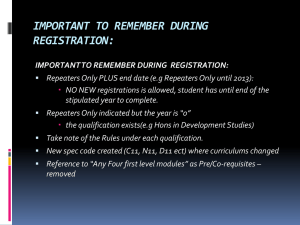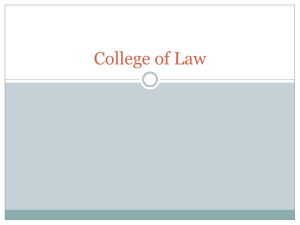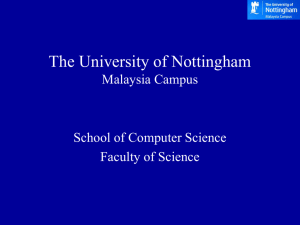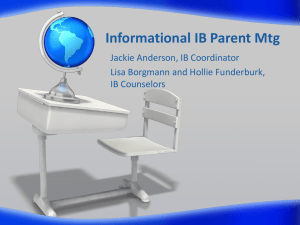Problem areas - UNISA
advertisement
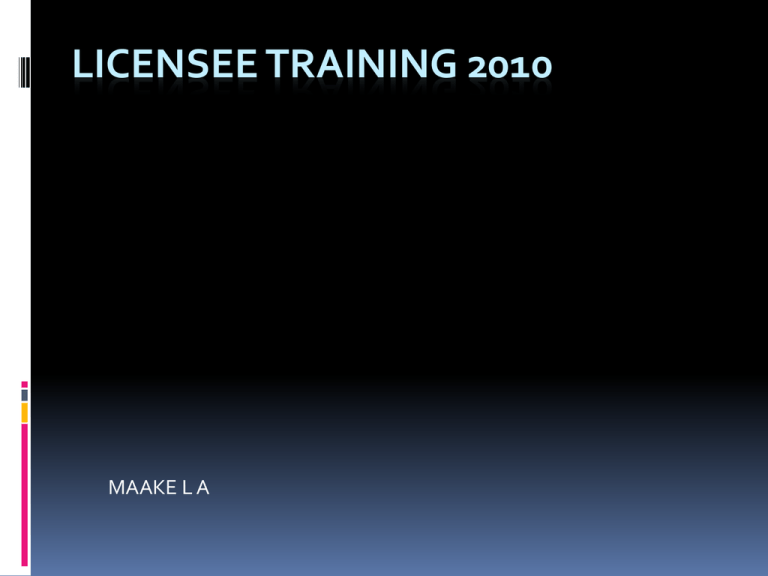
LICENSEE TRAINING 2010 MAAKE L A PROBLEM AREAS •Let us give the best service to students- keep records of our correspondences about student’s registrations •To do this we have to understand how we operate – licensees need to know and understand the Unisa registration procedures •Be the best unisa service center as you can – do not give students incorrect information or wrong advice. E.g especially when there are no fees in your account •Remember that you only have students for a semester/ year, and if they are not satisfied with your service, they will move on to the other Licensee • communication Inform us about any problems you have with the system Do not wait for the last days to voice your concerns – e.g. the closing date for the applications/ registration Talk to us before you spread the fire Respond to the emails we send to you in time in order to make amendments on registrations Make follow up on registrations not done- do not wait until it is too late – give students follow up dates Take note Take note that we only touch a query only once – if the registration is not done due to outstanding documents – when you send those documents also inform the registration office – my office at licensee@unisa.ac.za Send student queries separately – not in a list form ISSUES DELAYING REGISTRATIONScont.. CERTIFICATION OF DOCUMENTS – what are the accepted certifications? Co and prerequisites – licensee advisors do not check student’s requested modules – when you submit the online registration, you get an automated response, act on that. Do not wait for us to get back to you. Pre-requisites means that you must have passed that subject and/or subjects before you can take the selected module. Co-requisites means that you must take the module indicated as a corequisite with the specific module. Lack of feedback to students, inform students of the outcome of their applications – do not call us and say the student is in your office and they want answers. ISSUES DELAYING REGISTRATIONS- cont.. ALSO ENSURE THAT STUDENTS DO MEET THE ADMISSION REQUIREMENTS FOR THE REQUESTED QUALIFICATION ENSURE THAT STUDENTS DO MEET THE ADMISSION REQUIREMENTS FOR THE REQUIRED MODULES. – KNOW THE CO AND PREREQUISITES. ENSURE THAT STUDENTS DO NOT REGISTER FOR MODULES WHICH EXCEED THE REQUIRED NQF CREDITS– GIVE EXAMPLES ENSURE THAT STUDENTS DO UNDERSTAND THE DIFFERENCE BETWEEN COMPULSORY, AND ELECTIVE MODULES. ENSURE THAT STUDENTS ARE REGISTERED FOR THE REQUIRED NUMBER OF MODULES IN A SEMESTER/ YEAR Students in the final semester of study for a qualification weighted at 240 credits or more may apply to register for an additional 24 credits if to do so will enable the student to complete the registered qualification. Application to take the additional modules must be made to the Deputy Registrar on the Unisa prescribed form. In order to be eligible for the application of this rule, the affected student must have a minimum overall average of 55% in all modules previously passed. ISSUES DELAYING REGISTRATIONS- cont.. As the module codes change from time to time, please check the table of equivalents for modules that you might have passed and had a different code previously IMPORTANT TO REMEMBER DURING REGISTRATION: IMPORTANT TO REMEMBER DURING REGISTRATION: Repeaters Only PLUS end date (e.g Repeaters Only until 2013): NO NEW registrations is allowed, student has until end of the stipulated year to complete. Repeaters Only indicated but the year is “0” the qualification exists(e.g Hons in Development Studies) Take note of the Rules under each qualification. New spec code created (C11, N11, D11 ect) where curriculums changed Reference to “Any Four first level modules” as Pre/Co-requisites – removed Registration for non-degree purposes (NDP) Students intending to register for a module – even for non-degree purpose – must meet the admission requirements for the qualification in which the study unit is offered, eg registration for a study unit at Honours level can only be considered if student meets admission requirement for the Honours qualification concerned. Additionally, student must meet pre and co-requisites for modules to be taken for NDP. A student may be allowed to register a maximum of 4 modules for non-degree purposes; whilst registered for a formal undergraduate Diploma or Degree qualification that has a minimum duration of 3 or 4 years. A student may be allowed to register a maximum of 2 modules for non-degree purposes; whilst registered for a formal undergraduate Diploma or Degree qualification that has a minimum duration of 1 or 2 years, exclusive of the University Access Programme for which no modules may be taken for NDP whilst registered for the Access Programme. A student who is registered for an honours bachelor’s degree may, only with the special permission of the Executive Dean of the respective College that offers the Honours qualification, also register in the same academic year for not more than two undergraduate modules for non-degree purposes (NDP). A student who is registered for a master’s degree may, only with the special permission of the Executive Dean of the respective College that offers the Masters qualification, also register in the same academic year for two undergraduate modules or for one honours module or the corresponding number of modules on the same level for non-degree purposes (NDP). A student who is registered for a doctor’s degree may, only with the special permission of the Executive Dean of the respective College that offers the Doctors qualification, also register in the same academic year for two undergraduate modules or for one honours module or one master’s module or the corresponding number of modules on the same level for non-degree purposes (NDP). Application for credits and exemptions Students applying for credits and exemptions for studies passed at other accredited higher education institutions must do so on the prescribed form and in accordance with the Unisa rules as stated in the Unisa Brochures. Specifically, Applicants must meet the admission requirements for the qualification for which they are applying for credit/s and exemption/s; and maximum of 50% of the prescribed NQF credits may be awarded in the form of credits and exemptions. A student may not be exempted for more than one major subject toward a qualification for which 2 major subjects are prescribed. No exemptions will be granted towards an Honours or Masters qualification from any completed qualification Where the final year of a qualification comprises only year modules (as opposed to semester modules), the above rule will evenly apply: however, application for the additional 24 credits may be made at the beginning o the final year of study. Transitional arrangements OLD CODE NEW CODE ADB121S ADB1501 PRL1M1Z PVL101Q PRL1M2Z PVL203V PRL2M1X PVL303Y PRL2M2X PVL202U PRL3M15 PVL301W PRL3M2T PVL302X As from 2008 no new registrations were accepted for this qualification. Students have until the end of 2011 to complete this National Diploma. Students who were in possession of a Matriculation Exemption Certificate at the time of registering for this National Diploma for the first time and who do not complete their National Diploma by the end of 2011, will be allowed to register for the LLB degree. Where applicable, relevant credits will be granted towards the LLB degree. Ndip: Correctional Services Management (NDCSM – OLD) Students have until the end of 2012 to complete this curriculum of this National Diploma. Students who do not complete this curriculum of the National Diploma by the end of 2012, will be allowed to register for the revised National Diploma in Correctional Services Management. Where applicable, relevant credits will be granted towards the National Diploma in Correctional Services Management. Ndip: Correctional Services Management (NDCRS) This qualification replaced both the old curriculum (NDCRS) and the revised curriculum (NDCSM) of the National Diploma: Correctional Services Management as from 2010. Students are allowed to switch over from the National Diploma in Correctional Services Management (old and revised curriculum) to the New Curriculum (from 2010). Where applicable, relevant credits will be granted towards the New Curriculum (from 2010). Ndip: Policing (NDPLC) Credits will be given for the following modules if the first phase of Basic Training at the SAPS Training Colleges passed since 1998. A certified copy of the certificate or letter signed by the commander of the college must be submitted together with the application for credits. OVM1501 OV1502 POL1501 POL1502 Students have until the end of 2013 to complete this curriculum of this National Diploma. Students who do not complete this curriculum of the National Diploma by the end of 2013, will be allowed to register for the revised National Diploma in Policing. Where applicable, relevant credits will be granted towards the National Diploma in Policing. Ndip: Security Risk Management (Prior to 2010) Students have until the end of 2011 to complete this curriculum of this National Diploma. Students are allowed to switch over from the National Diploma in Security Risk Management (old curriculum) to the New Curriculum (from 2010). Where applicable, relevant credits will be granted towards the New Curriculum (from 2010). LLB DEGREE- TRANSITIONAL ARRANGEMENTS OLD CODE NEW CODE ILW1036 ILW1501 SCL1014 SCL1501 FLS101V FLS1501 FLS102W FLS1502 PVL101Q PVL1501 PVL203V PVL2601 PVL202U PVL2602 PVL303Y PVL3701 PVL301W PVL3702 PVL302X PVL3703 PVL3043 PVL3704 CIP201G CIP2601 CIP301K CIP3701 CMP301A CMP3701 CRW201X CRW2602 CSL201M CSL2601 FUR201F FUR2601 IND203X IND2601 MRL203L MRL2601 MRL301M MRL3701 MRL303P MRL3702 EVI301A EVI3701 ADL201M ADL2601 LLB CONT… Note that the module codes for elective modules have also changed Make sure to understand the transitional arrangements in My Registration before registering a student BTech: Policing (BTPLC) Disregard the rules in MyRegistration@unisa – 2011 New students may still register for this qualification. Note that is compulsory to do both modules of End-user should the student choose to do it as an elective – EUP131T + EUP1501 BTech: Security Risk Management (BTSEC) Note that the code for CET181T has changed – please ensure that students do both FAC1051 & MAC1501. This change was not done in the My Registration for 2011 Full explanation on the bridging course is set out in the My Registration on page 49 BTech: Forensic Investigation (BTFIN Students registering for this qualification must be in possession of a National Diploma: Policing or equivalent qualification in Criminal Justice Field. E.g. Criminology, Security Risk Management, Correctional Science Management. Uncertainties with regards to equivalent qualifications should be referred to the Chair of the Department. Due to the fact that the course is very practical, it was found that students who are not involved in investigation field experience serious problems during their study period. It is advised that students who register for this course should be involved in investigation or should be having investigative experience College of Human Sciences DIPLOMA/ CERTIFICATES no new registrations Diploma in Development Studies Diploma in General Nursing (Bridging Course) Diploma in Information Science Diploma in Information Services for Children and Youth Diploma in Social Development National certificate in Archival Studies New Qualification Postgraduate Diploma in Public Health Qualification with new Spec Codes: 02070 Bachelor of Musicology 02291 Community Development 02291 Development Studies 02283 Creative Writing Honours Degrees For 2011 Departments have revised the curriculum. Curriculums comprises 5 Compulsory papers Research Report and Research paper has been introduced Check spec codes for the revised curriculums Students are strongly advised to pass the content/theory papers first and register for Research & Report papers last. Honours Degrees phased out: 05843 TESOL (Teaching English to speakers of other languages) 05835 Sociolinguistics Students have until 2014 to complete both qualifications. Hons PSYCHOLOGY Major changes: Three Streams were introduced – check the admission requirements in the calendar Psychological Counseling Applied Psychology for Professional Context Community and Health Psychology The curriculum is different therefore advise students choose the correct stream. Admission requirements are still the same. College of Human Sciences Education Advanced Certificate in Education This is a re-skilling qualification, for teachers who have a 3 or 4 year teachers diploma- who intends to change their teaching specialisations. The intention of ACE is to give teachers to change their current specialisations in order to teach another subject. E.g from teaching geography to qualify for Life Orientation Continues……………….. ACE – ADMISSION REQUIREMENTS A COMPLETES 3 OR 4 YEARS TEACHING QUALIFICATION Matric certificate Check the different specialisations for the additional admission requirements ACE FOREIGN STUDENTS ALL THOSE WHO HOLD FOREIGN QUALIFICATIONS , WHO INTENDS TO TEACH IN SA, MUST FIRST CHECH WITH DOE WHETEHR THE QUALIFIACTION COMPLY WITH THE STATUTORY REQUREMENTS FOR THE PROPOSED QUALIFICATION College of Human Science – Higher certificate in abet The current curriculum with 4 modules will [phase out in 2012. From 2011 a new curriculum with 10 modules will be introduced. There are no transitional arrangements between these two qualifications- those who do not complete the old curriculum by the end of 2012, they will have to continue with the new curriculum. Postgraduate certificate in Education AMDISSION REQUIREMNTS Matric A BACHELORS DEGREE OR National Diploma which includes the following At least 2 languages on first level 1 school subject up to 2ns level in one of the approved school subjects.- the list of approved school subject appears in the calendar Postgraduate certificate in Education All foreign qualifications must be referred to the National Department of Education for the purpose of Evaluation for students intending to teach in South Africa– this is not UNISA‘s responsibility and the student must be requested to do it themselves. SAQA evaluations are not accepted for the purpose of registration!!! Foreign qualifications for students wanting to teach outside the borders of South Africa will be dealt with on an adhoc basis and a SAQA evaluation may then be required. PGCE PGCE- requirements Students registered DIRECTLY for PGCE modules whilst still having outstanding requirements May register for the PGCE on condition that only ONE requirement is outstanding Outstanding requirement must be done in FIRST YEAR of registration for PGCE Subject and /or Learning Area Didactics Students are registered for Didactics/Learning Area in subjects that has relevance to subjects passed in completed qualification. This cannot be over emphasised – the qualification will not be issued unless the student complies with the specific requirements of the didactics. Ensure that you understand the requirements for a Didactics/Learning Area – not negotiable with the student . Should the student wish to offer a didactic other than the one he qualifies for, the required undergraduate modules must first be offered for NDP. PGCE The PGCE(EARLY CHILDHOOD DEVELOPMENT) 02631 (Spec. ECD) will phase out by 2013 – under no circumstances may any new registrations be allowed in 2011. Repeaters ONLY. The PGCE (Intermediate and Senior phase) (02631) has a new curriculum for 2011 - please take special care of the following: Students currently registered must register for the old curriculum – please use spec code (OLD) New registrations must register under the same qualification code but with spec code (NEW) – you will notice that there are now modules from the SNR &FET included in this program. – This is going to create unique problems in 2012 since these modules are only valid for 2011. PGCE (Foundation Phase) – 02631 (spec FDP) – Module PGC403B is replaced by ETH306W. PGCE PGCE (SNR&FET) – 03980 has both an old and new curriculum students who obtained credit prior to 2010 must complete the OLD 13 module curriculum without either “OLD” or “NEW” in the spec code, the advisor will not have access to the qualification structure. Learning Area didactic Technology module FDETE5E is replaced by LADTECX BACHELOR OF EDUCATION ADMISSION REQUIREMENTS SENIOR CERTIFICATE ALL TEACHONG PRACTICALS ARE DONE IN SOUTH AFRICA BED BEd(ECD) – 02593 Module EDT202L has been replaced by EDA3046 Module EDT203M has been replaced by ETH302S MAE (Mathematics Education) modules will only be offered for repeaters. Any student who wishes to offer mathematics as part of their school subjects has to register for Maths as pre-scribed for the BEd(SFET). BEd(INT) – 02607 Module EDT202L has been replaced by EDA3046 MAE (Mathematics Education) modules will only be offered for repeaters. Any student who wishes to offer mathematics as part of their school subjects has to register for Maths as pre-scribed for the BEd(SFET). BEd(SFET) – 02615 Educational themes now only comprise 14 modules. School subjects now comprise of 16 modules in a 2-2-1 or 3-1-1 combination. Subject didactics and learning area didactics must be relevant to the school subjects being offered. The practical language module LPENGPN can only be offered with one of the teaching practice modules Please take special notice of the prerequisite requirements for didactics in Hospitality Studies – UNISA offers it!! Learning Area didactic Technology module FDETE5E is replaced by LADTECX All applications for exemption from teaching practice modules must be referred to the RPL office and not the academics. The student should apply through the RPL office themselves. Student advisors/Licensee team You know !!!!!!!!!!! Student advisors/Licensee team Without you – there is no Licensee section
